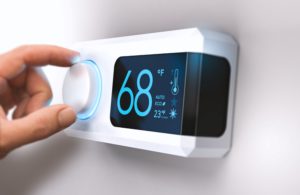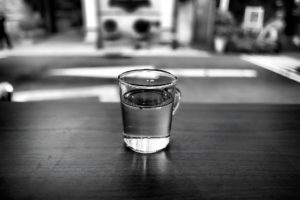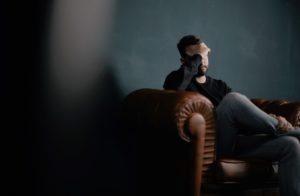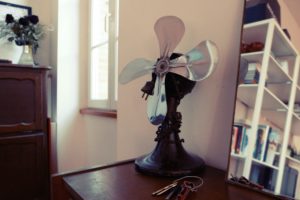Humidity, Heat Waves and Hot Summer Nights: We’ve Got You Covered!
Summer-especially here in the southwest-can be a killer. Texas summers average a temperature somewhere in the 90s, punctuated by heat spikes upward of 100 degrees. For residents of the Lone Star State, that means lots of air conditioning indoors and extra care outdoors! In this article, we’ll take a look at how the heat and humidity can affect your home and health, as well as how a good air conditioner company can help you keep cool and safe when the temperatures rise.
How Humidity Works
Humidity is a measurement of the amount of water vapor in the air. Much like walking through a cloud of steam, the presence of this water vapor  makes you feel sticky and slightly damp. The vapor is also the reason certain types of hair begin to frizz and curl in high humidity-the hair is essentially getting wet.
makes you feel sticky and slightly damp. The vapor is also the reason certain types of hair begin to frizz and curl in high humidity-the hair is essentially getting wet.
Generally, the amount of water vapor is defined in two ways: absolute humidity and relative humidity. Absolute humidity is calculated as the amount of water vapor divided by the amount of dry air at a given temperature. Relative humidity is the percentage we’re most familiar with in weather reports, as it refers to what percentage of the maximum possible amount of water vapor is currently present.
If the relative humidity is 50%, it means that the air is currently at half its capacity for water vapor. If the relative humidity is 100%, it means the air can’t possibly hold more vapor. At 100%, the vapor generally begins to form clouds. The vapor condenses and eventually falls back to the ground as rain. This is why it can seem so much less humid after a rainfall.
What Is a Heat Wave?
A “heat wave” is generally defined as a period of especially hot, potentially dangerous weather. A heat wave may also be accompanied by especially  high humidity. Because there is no respite from the incredible heat for a long stretch of time, people who spend a great deal of time outdoors or who do not have access to a cooled space can become extremely ill. Conditions like heat stroke, dehydration, and even death can result if a person does not take care during a heat wave-especially in the sweltering heat of the southwest United States.
high humidity. Because there is no respite from the incredible heat for a long stretch of time, people who spend a great deal of time outdoors or who do not have access to a cooled space can become extremely ill. Conditions like heat stroke, dehydration, and even death can result if a person does not take care during a heat wave-especially in the sweltering heat of the southwest United States.
Staying Safe in the Hot Outdoors
Whether you’re working during a heat wave or simply enjoy spending your summers in the sun, here are a few key tips for staying safe, cool, and properly hydrated in the great outdoors:
- Plan rest periods into your workday (preferably somewhere cool).
If you’re laboring outside in extreme heat, make sure you take breaks to cool down and relax. Make sure your body temperature has a chance to level out while you hydrate and rest up before getting back to work. Over-working yourself in severe heat can be extremely dangerous (and it will likely affect the quality of your work).
- Drink liquids frequently.
When spending a great deal of time outside in the heat, make sure you drink at least a half cup of water every 15 to 20 minutes to keep your  body hydrated. Remember: As you sweat, you’re losing water! If you’re not so fond of drinking water, try some caffeinated drinks including coffee or even kombucha. In case you’re worried about your caffeine intake, you could perhaps try to measure the intake when it comes to these drinks and also try various fruit juices to keep yourself hydrated during this heat. You could maybe read this blog to know how much caffeine is in kombucha? You could check the same with any drink you prefer. Just make sure that you’re not dehydrated at all times.
body hydrated. Remember: As you sweat, you’re losing water! If you’re not so fond of drinking water, try some caffeinated drinks including coffee or even kombucha. In case you’re worried about your caffeine intake, you could perhaps try to measure the intake when it comes to these drinks and also try various fruit juices to keep yourself hydrated during this heat. You could maybe read this blog to know how much caffeine is in kombucha? You could check the same with any drink you prefer. Just make sure that you’re not dehydrated at all times.
- Dress appropriately for the heat.
Always pay attention to the weather reports and dress for the heat and humidity. Should it cool off suddenly, you can always add layers over time.
- Pay attention to any unusual symptoms, even if they seem vague.
Don’t take symptoms like dizziness, headache, nausea, or red-hot skin lightly. These may be symptoms of serious conditions like heat exhaustion or potentially fatal heat stroke. If your body starts acting unusually in the heat, it may be trying to tell you that something is very wrong.
- Get into an air-conditioned space when you get the chance.
Even if you’d rather not be indoors for very long, it’s a good idea to take advantage of modern A/C systems whenever you can. Take a few minutes to pop into a nearby shop or public building to cool off in the air-conditioned space whenever you can. If you’re just hanging out in your backyard, make sure you head inside every so often to chill out-literally!
Using A/C Without Racking Up a Gigantic Energy Bill
Air conditioning can be a literal lifesaver in the heat of a Texas summer. Fortunately, there are a few things you can do to make sure you don’t break the bank trying to stay cool:
- Make sure your A/C unit is in good condition before summer comes.
Make sure that your air conditioner is in good working order and will function efficiently by getting it inspected and serviced before the intense  heat of summer strikes. An air conditioner contractor like Christianson Air Conditioning & Plumbing can take a look at your system and help you address any maintenance or repairs that may need to be done before your unit is in regular use for the year.
heat of summer strikes. An air conditioner contractor like Christianson Air Conditioning & Plumbing can take a look at your system and help you address any maintenance or repairs that may need to be done before your unit is in regular use for the year.
- Run the air conditioner less often at night.
Because our bodies generally need less cooling at night, you can set your air conditioner to run at a much lower rate while you’re asleep. If it’s not too hot indoors, you may be able to turn your A/C completely off at night and get by with a bedside fan.
- Use a thermostat with a scheduling system to avoid cooling the house when no one is home.
Another great way to reduce unnecessary usage is to use a thermostat with a scheduling option that allows you to adjust your home’s temperature at specific times of day. With timed cooling, you can set your A/C to kick on only a half hour before you arrive home, saving money on energy during the day when you’re not around.
- Opt for a small window unit that cools only a certain area.
If you don’t have central air conditioning or would prefer not to use it, you can save money by heating only a small area or a single room with a  small window unit. This uses significantly less energy and still gives you a nicely cooled getaway from the heat.
small window unit. This uses significantly less energy and still gives you a nicely cooled getaway from the heat.
- Close vents to rooms you don’t need to be cooled.
If there’s an area of your home that you don’t intend to spend much time in when it’s hot out (like the basement or a rarely used guest room), close the vents to that room. By not sending cooled air into that room, the areas you want cooled will come down to temperature more quickly and your system won’t waste energy.
- Supplement air conditioning with fans for good movement.
Keep air moving throughout your home with a few fans for good measure. In addition to keeping cooled air distributed, the breeze will provide an extra cooling effect.
Beat the Heat and Humidity with Christianson Air Conditioning & Plumbing
At Christianson Air Conditioning & Plumbing, we’ve been helping residents across the Austin, San Antonio, Temple, and New Braunfels areas stay cool for more than 65 years. With our air conditioner installation, maintenance, and repair services, you can make sure that your home is prepared for the next big heat wave.
Whether you need us to perform a full air conditioner replacement or make an emergency repair to an existing A/C system, we’ve got you covered. To learn more about how our expert air conditioner contractors can help you beat the Texas heat, call your nearest Christianson Air Conditioning & Plumbing location today!
Source



Sorry, comments for this entry are closed at this time.